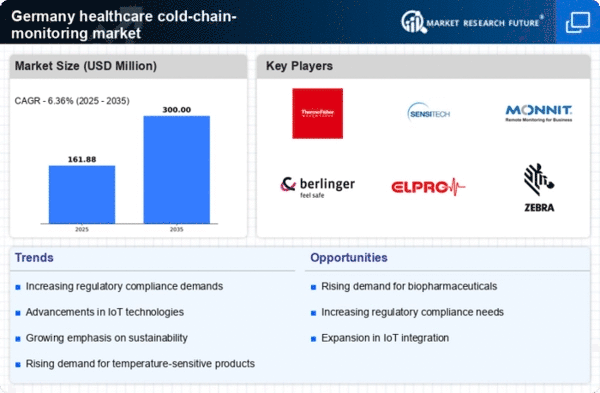Rising Demand for Biologics
The increasing demand for biologics in Germany is a crucial driver for the healthcare cold-chain-monitoring market. Biologics, which include vaccines, blood products, and gene therapies, require stringent temperature control during storage and transportation. The market for biologics is projected to grow at a CAGR of approximately 8% over the next few years, necessitating robust cold-chain solutions. As healthcare providers and pharmaceutical companies expand their biologics portfolios, the need for reliable cold-chain monitoring systems becomes paramount. This trend underscores the importance of maintaining the integrity of temperature-sensitive products, thereby driving investments in advanced monitoring technologies within the healthcare cold-chain-monitoring market.
Increasing Regulatory Scrutiny
The healthcare cold-chain-monitoring market is experiencing heightened regulatory scrutiny in Germany, which serves as a significant driver for the industry. Regulatory bodies are enforcing stricter guidelines regarding the storage and transportation of temperature-sensitive products. Compliance with these regulations is essential for healthcare providers and pharmaceutical companies to avoid penalties and ensure patient safety. The implementation of robust cold-chain monitoring systems is becoming a necessity to meet these regulatory requirements. As a result, investments in compliance-driven technologies are likely to rise, with the market expected to grow by approximately 15% as organizations seek to enhance their monitoring capabilities in the healthcare cold-chain-monitoring market.
Growth of E-commerce in Pharmaceuticals
The growth of e-commerce in the pharmaceutical sector is a notable driver for the healthcare cold-chain-monitoring market in Germany. As online pharmacies and telehealth services expand, the demand for efficient cold-chain logistics increases. E-commerce platforms require reliable cold-chain solutions to ensure that temperature-sensitive products reach consumers in optimal condition. This shift towards online distribution channels is projected to contribute to a market growth rate of around 20% over the next few years. Consequently, companies are investing in advanced cold-chain monitoring technologies to support the logistics of e-commerce, thereby enhancing the overall efficiency of the healthcare cold-chain-monitoring market.
Focus on Patient Safety and Quality Assurance
The emphasis on patient safety and quality assurance is a driving force in the healthcare cold-chain-monitoring market. Healthcare providers in Germany are increasingly prioritizing the integrity of temperature-sensitive products to ensure patient safety. This focus is leading to the adoption of comprehensive cold-chain monitoring systems that provide real-time data and alerts regarding temperature fluctuations. As patient safety becomes a central concern, the demand for reliable monitoring solutions is expected to rise. The market is likely to see a growth of approximately 12% as healthcare organizations invest in technologies that enhance quality assurance in the healthcare cold-chain-monitoring market.
Technological Advancements in Monitoring Solutions
Technological advancements are significantly influencing the healthcare cold-chain-monitoring market in Germany. Innovations such as real-time temperature tracking, automated alerts, and data analytics are enhancing the efficiency and reliability of cold-chain operations. The integration of IoT devices allows for continuous monitoring and reporting, which is essential for compliance with regulatory standards. As the market evolves, companies are increasingly adopting these advanced solutions to mitigate risks associated with temperature excursions. The adoption of such technologies is expected to increase by over 30% in the coming years, reflecting a growing recognition of their value in ensuring product safety and efficacy in the healthcare cold-chain-monitoring market.






















Leave a Comment